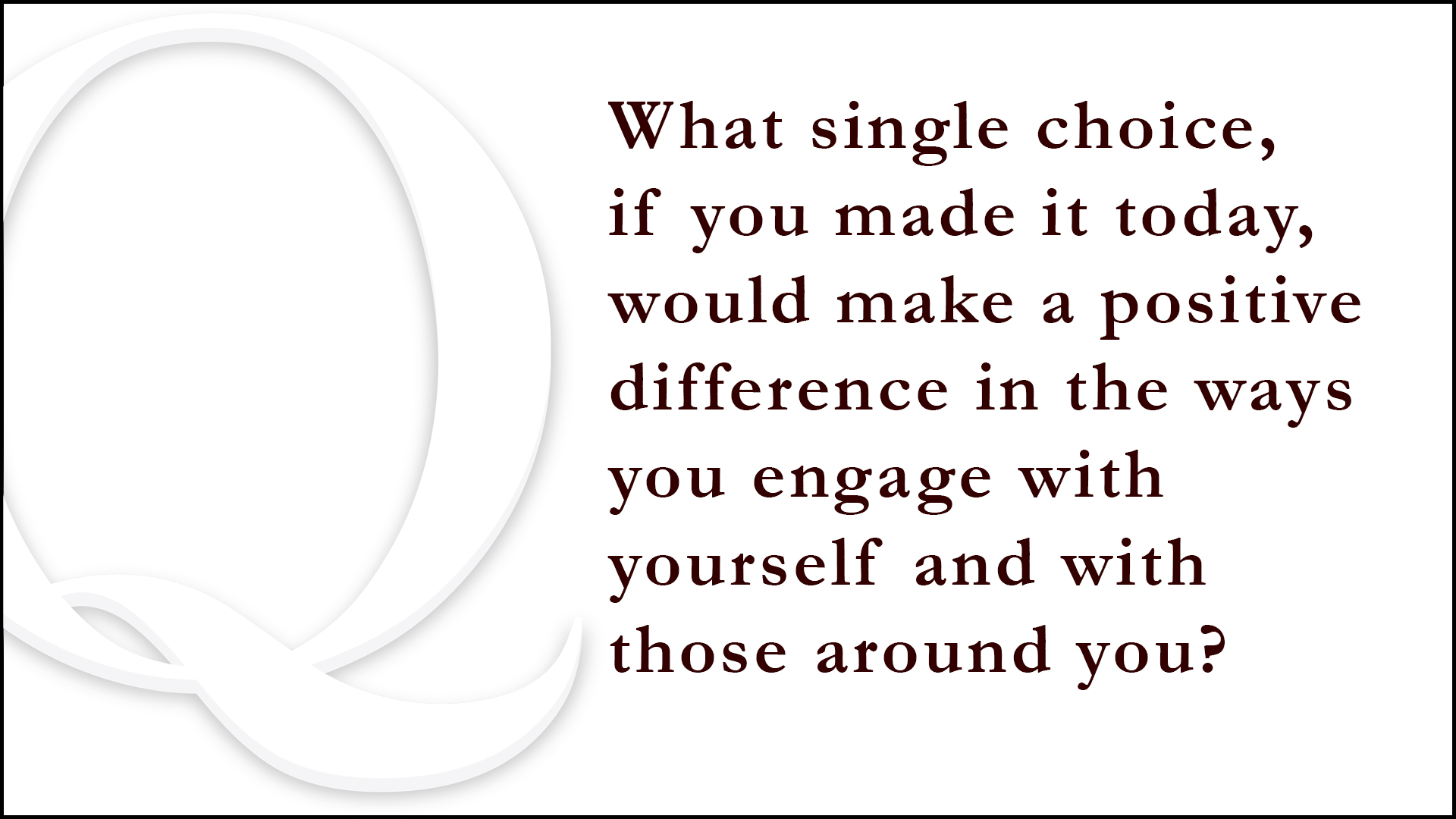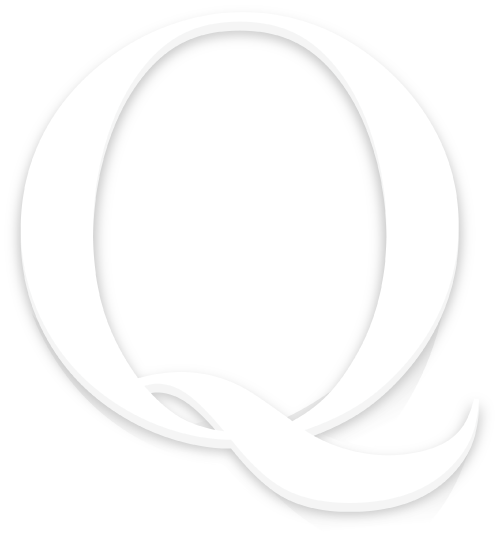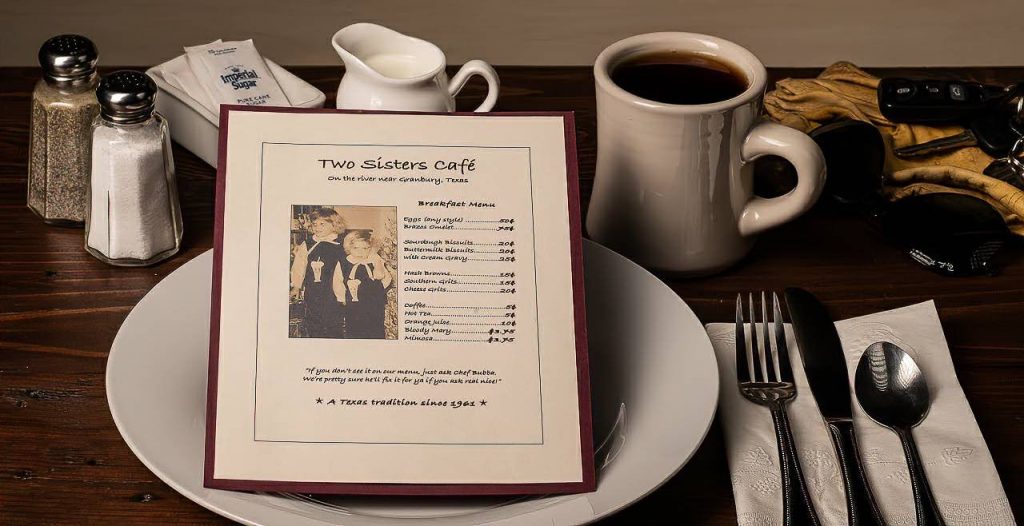Because I Choose To
[ theme music & intro ]
How aware are you that regardless of what’s happening to you or around you, you have choices?
Join me this week as we consider the nature of choice and ways of consciously remaining in control of the ones we make.
[ brief pause as theme music fades ]
Even if you’re not a fan of science fiction movies, you might appreciate an important line spoken by the central character in the Matrix series. In the film’s most pivot scene, the good guy (Mr. Anderson, played by Keanu Reeves) and the bad guy (Mr. Smith, played by Hugo Weaving) are having what will prove to be the final battle for the freedom or complete subjugation of humankind.
Anderson is being soundly thrashed but keeps getting back up after each beating. Because of that, Mr. Smith becomes confused.
He can’t understand why Mr. Anderson doesn’t accept defeat and surrender to his dark fate.
Angrily questioning Mr. Anderson’s purpose, Smith asks, “Why, Mr. Anderson? Why, why do you do it? Why do you get up? Why do you persist?” Anderson speaks for all of humanity in the face of evil, or oppression, or tyranny when he quietly says,
“Because I choose to.”
In the film, the “matrix” is a system of control that gives no room for the individual’s freedom to choose. When Mr. Anderson refuses to give in and chooses what he thinks and what he does, Mr. Smith and the matrix are shattered.
[ brief pause ]
It’s been said that choice is something no one can take from you. It is one of the most fundamental aspects of being human. When dealing with the mundane ins and outs of our daily lives, we have options. In the face of what seems overwhelming or hopeless, we have options. Whether we’re facing life or death, we still have options—we still have choices.
When I was facing the biggest challenge of my life, long before the Matrix films came out, I was no fictional character in a post- apocalyptic movie. I was a living human being with real consequences ahead of me. To survive the ordeal, I had to make a number of intentional choices and then carry them out, step by step, one at a time.
One of them was whether or not to survive. (And, no, I’m not kidding.) Another was to participate in my own treatment.
Another was to actively monitor my own self-talk and the information I took in from the sources around me.
Yet another was the choice to replace my negative attitude with the positive and realistic one I would need in order to take the steps I needed to take. Though I still couldn’t speak clearly and was living only on liquids, a process that would continue for two years after my procedures, I chose to get up and go back work. In those days, I was leading a psychiatric evening program at a Fort Worth hospital. Making that choice helped me re-engage with my life and with the work that added so much meaning to it.
Once I made the choice to survive and keep going, every step that followed was shaped by that decision. When I struggled mentally and physically and emotionally, as I certainly did, I would bring myself to a stop and remind myself, “I chose these steps and I’m choosing them now.” Looking back, I’m so glad I did. Whatever it took to get where I am today has been completely worth it.
[ brief pause ]
I strongly doubt you’d go to a café and tell the person serving you, “That’s okay, I’ll be fine with whatever you bring me.” You’d look over the menu, choose what you wanted, order it, and then enjoy what you ordered. In many ways, the rest of life can happen the same way.
photo: Scott Lennox
Every day, regardless of our situation or where we find ourselves as it unfolds in us or around us, there are myriad choices each of us can make. One of the central ones is choosing whether we’re going to react to what’s happening or mindfully respond to it. Reactions are automatic. Responses are planned and thought- through.
Imagine that you have miles to go and you can see the road out ahead of you, not all of it pleasant. How will you choose to travel it? Will you complain about each turn and obstacle and about the condition of the road or the weather?
Or will you choose to flow with your situation without becoming unnecessarily upset? Asking that another way, will you choose to align with what is—exactly as it is—or will you push against it, becoming more irritable and upset as you go?
I’m not suggesting that we need to enjoy having a bad time or that we must approve of or agree with something as we deal with it. But if we’re going to stay in healthy control of ourselves, how important is it that we see things as they are, and then work with them instead of fighting against them?
[ brief pause ]
Our current highly charged political season is made all the more intense by the fact of the pandemic. In the midst of all of the swirling intensity, how much will you surrender your thoughts and emotions to one issue or another, or to one candidate or another, or to on group of supporters or protestors? Whether you agree or disagree with them, how long will you allow yourself to be pushed away from remaining consciously balanced?
Or might it be better to see things as they are, make your own choices, and return to being in control of yourself?
Let’s say you don’t like wearing a mask in public places or not being able to move around as freely as you did a few months ago. What choices can you make that will allow you to maintain a sense of inner freedom?
A co-worker or a family member or your spouse behaves in ways you can’t control and don’t agree with. What choices can you make that will keep you from reacting and allow you to stay calm?
You find yourself repeatedly awakening in the night. What choices can you make that allow you to get back to sleep?
With only these few examples, you can see how important it is to remember that you have a choice, regardless of what’s happening.
[ brief pause ]
Once again, you might find this week’s Beautiful Questions to be predictable, yet nonetheless important.
One: At any given moment, in any given situation, what choices are available to you that will foster your highest good?
Two: When it comes to reacting or responding to the world around you, what can you choose that will promote the greatest focus and peace of mind?
Three: In large things or small things, what overarching personal choice will guide your deliberation and your decision making?
Four: What single choice, if you made it today, would make a positive difference in the ways you engage with yourself and with those around you?
As you consider these questions, write and tell me about your conclusions. I choose in advance to stop and listen to what you have to say.
As I say each week,
My Light with Your Light
[ theme music swells and fades out ]
Subscribe to our newsletter for updates.


